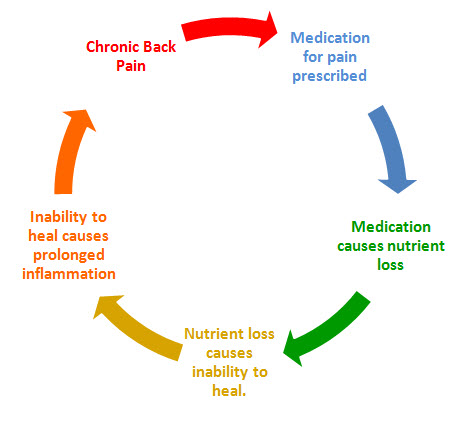Vitamin B5 (Pantothenic Acid)
Signs and Symptoms of Vitamin B5 Deficiency…
Vitamin B5 (Pantothenate)
Function:
Pantothenic acid plays vital roles in energy production from foodstuffs. Pantothenate is a component of coenzyme A, which is necessary for energy production from carbohydrates, fats, proteins, and other compounds, as well as synthesis of fats, cholesterol, steroid hormones, porphyrin and phospholipids.
Defciency Symptoms:
Fatigue, cholesterol abnormalities, hypoglycemia, achlorhydria, depression, burning feet, dermatitis, burning or pain of arms and legs, anorexia, nausea, indigestion, irritability, mental depression, fainting, hair loss, increased heart rate, susceptibility to infection, pre-mature graying and hair loss, headaches, and insomnia.
Repletion Information:
If deficient, supplementation is recommended to replete this nutrient.
Pantethine: this form of vitamin B5 is the active coenzyme and is more effective from a clinical standpoint.
Calcium Pantothenate: this form is commonly used in over the counter supplement products. It requires additional chemical reactions inside the body before it is activated.
The following foods are the richest dietary source of pantothenate:
Meat Nutritional yeasts
Whole grains Legumes
Vegetables Nuts
Seeds
Vitamin B5, otherwise known as pantothenic acid or pantothenate is a water soluble B-vitamin that is critical for normal function of the human body. This vitamin is also commonly called the anti-stress nutrient because it plays a role in the production of stress hormones by the adrenal glands. Deficiency of B-5 contributes to the inability to cope with stress. Additionally, pantothenic acid plays vital roles in energy production from foodstuffs. Pantothenate is a component of coenzyme A, which is necessary for energy production from carbohydrates, fats, proteins, and other compounds, as well as synthesis of fats, cholesterol, steroid hormones, porphyrin and phospholipids.
Signs and Symptoms of Deficiency:
Fatigue
Elevated cholesterol
Burning and pain in the arms and legs
Burning feet
Nausea
Indigestion
Irritability
Fainting
Hair loss
Elevated heart rate
Susceptibility to infection
Premature graying of the hair
Hair loss
Vitamin B5 has been shown to be beneficial for the following conditions:
Achlorhydria
Depression
Dermatitis
Adrenal disease (adrenal burn out or failure)
Insomnia
High Cholesterol
Chronic Fatigue syndrome
Fibromyalgia
Drugs or Medications that may interfere with or deplete vitamin B5:
- caffeine
- high blood pressure medications
- acid reflux medications
The following foods are the richest dietary source of pantothenate:
The term pantos is Greek and means “everywhere”, therefore; B5 is found in most foods. Meat, legumes, vegetables, nuts, and seeds are rich sources.
















